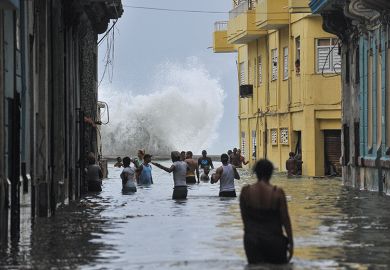Universities have been urged to take increasingly radical steps to help combat climate change, with flights to conferences the top target.
A report commissioned by one UK university recommends that the institution cut the carbon footprint from long-haul air travel by 50 per cent by 2025 and by 75 per cent by 2030, while academics are organising online conferences with regional hubs in a bid to reduce flying while maintaining face-to-face networking.
The call for action comes after UK sector organisations last week launched a Climate Commission for UK higher and further education leaders, which aims to create a “clear, cohesive and consistent response” to the climate emergency, and will examine academics’ travel arrangements.
Juliet Osborne, chair in applied ecology and leader of the environment and climate emergency working group at the University of Exeter, which published the new report, said that while there were undoubtedly cases where academics “absolutely have to meet face to face…it feels like no one’s even been considering [cutting down on flights] so far in some universities”.
She said that academics could be better at sharing the outcomes of conferences to reduce the number of scholars attending each event and universities could highlight the health and equality benefits to reducing travel.
“If we can improve the quality of international interactions where you don’t need to fly, that’s going to benefit a large part of the community who’ve effectively been left out until now because they have responsibilities which mean they can’t go on these trips,” she said.
Professor Osborne added that academics’ annual targets and promotion criteria often include participating in international trips or conferences, but these could be reframed to ensure that they are not a tick-box exercise, while institutions could work harder at creating a campus community during holidays so international students do not have to travel back home at the end of each term.
Sam Desiere, senior researcher at the Research Institute for Work and Society at KU Leuven and author of a 2015 study that estimated the carbon footprint of an academic conference in Ljubljana, said that there was a “tension between research and international networks on the one hand and reducing flying on the other hand”, but that there were a number of ways in which institutions could reduce their carbon footprint.
Leuven, for example, has introduced a voluntary carbon tax of €40 (£34) per tonne of carbon emitted for academics who travel by air. The money is used to invest in green activities at the institution. However, Dr Desiere said his main recommendation would be to “start a debate about” reducing universities’ carbon footprint.
“At least in Belgium, most universities are not really thinking about it. They are not doing anything to reduce flying, to reduce emissions from academic conferences,” he said.
One group of physicists from the UK, the US, Australia, Switzerland and Canada has organised an online conference with regional hubs across the world to enable participants to network face to face while reducing their carbon footprint. So far 347 people have registered to attend across 40 hubs.
Andrea Armani, Ray Irani chair in chemical engineering and materials science at the University of Southern California and one of the organisers of the event, said that virtual conferences can “reinforce the idea that science is done alone” but “we wanted to overcome that stereotype and bring together researchers across age groups and try to create a smaller sense of community locally”.
Robin Shields, professor of education at the University of Bristol, who wrote a recent study estimating the carbon footprint of global student mobility, said that the topic was “a very awkward conversation in many universities”.
“A lot of universities have an office for sustainability or a director in that area who is asking these questions, but if you go to the international office they’re not [always] very happy to engage in this,” he said.
“The way it’s separated means that universities can often avoid addressing issues as directly as they might. It’s often a strategic decoupling of these things that makes it easy to both pursue the green agenda and the neoliberal international student funding-driven agenda simultaneously.”
Professor Shields added that universities will have a limited impact if they focus only on their own consumption and called for them to pressure politicians to change laws in this area.
“If there’s a school climate strike I don’t know why there hasn’t been a university climate strike yet,” he said. “Why haven’t academics said we’re not going to work for a week just to show how important this is or we’re not going to fly for conferences for a month? That would be very interesting.”
Register to continue
Why register?
- Registration is free and only takes a moment
- Once registered, you can read 3 articles a month
- Sign up for our newsletter
Subscribe
Or subscribe for unlimited access to:
- Unlimited access to news, views, insights & reviews
- Digital editions
- Digital access to THE’s university and college rankings analysis
Already registered or a current subscriber?










